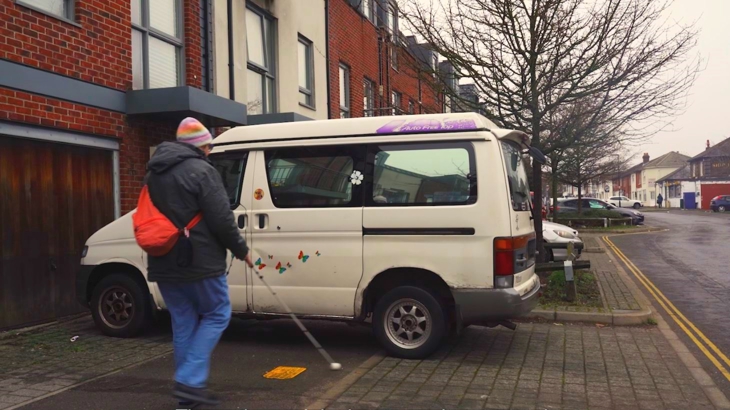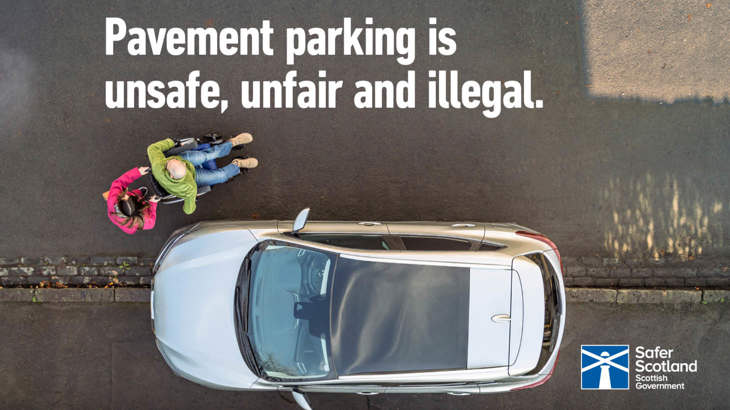In 2019, the Scottish Parliament passed legislation banning pavement parking. Four years on, as Scotland’s local authorities begin enforcing the ban, our Scotland Director Karen McGregor explains why this is a long-overdue victory for equality.

Parking along pavements can put older people, people with reduced mobility or in wheelchairs, or people travelling with pushchairs in real danger. Credits: Toby Spearpoint/Sustrans
Why is putting an end to pavement parking important?
It seems obvious to say it, but our pavements should put people - and not vehicles - first.
Navigating around vehicles parked on pavements is a bit of a nuisance for everyone.
But the grim reality is that for older people, people with reduced mobility or in wheelchairs, or people travelling with pushchairs, it can be a real danger.
Many of us have seen the young mum try to navigate a pushchair and a toddler onto the road because a car is parked on the pavement, taking up half of the footway.
Maybe we’ve maybe seen an elderly person do the same, risking a trip or a fall.
Or a person in a wheelchair making the decision between turning back or wheeling on to a busy road.
Pavement parking isn’t safe.
And pavement parking isn’t fair.
What is Scotland doing to ban pavement parking?
From January 2024, City of Edinburgh Council will become the first local authority in Scotland to begin issuing fines for pavement parking.
The Transport (Scotland) Act, passed in 2019, banned pavement parking, double parking and parking at dropped kerbs.
Since then, Sustrans, alongside many other active travel and disability organisations in Scotland, have been calling for the necessary steps to be taken to enforce the ban as soon as possible.
From 11 December 2023, national regulations have been put in place to allow Scotland’s councils to begin enforcement.
And following Edinburgh’s lead, many of Scotland’s other local authorities plan to follow on with their own enforcement during 2024.

The Scottish Government are making drivers aware they now face fines of up to £100 for parking illegally on the pavement. Credit: roadsafety.scot
What difference will the ban make in Scotland?
Banning pavement parking isn’t just about transport policy.
It’s a victory for fairness and equality across our public spaces.
It addresses a problem which puts some of our most vulnerable people in genuinely dangerous situations on journeys we all make everyday.
Last year, Sustrans worked with Transport for All on UK-wide research looking at how disabled people experience walking and wheeling.
The Disabled Citizens Inquiry then brought together recommendations made by disabled people to help our decision-makers make places and streets better for everyone.
73% of participants responded that banning vehicles from parking on pavements would be useful for them to walk or wheel more.
And the scale and seriousness of the problem was brought to life by the words of workshop participants.
June, who travels with her guide dog Clyde, said:
“One of my biggest challenges is vehicles parking on the pavement, particularly near junctions.
“When Clyde takes me out round a parked car, I can’t tell if it’s just one car, or a whole line of them. I don’t know how long I will be on the road for, and traffic can be very busy.
“I often have to orientate myself back and start all over again, or just return home.
“Pavements should be for pedestrians, but traffic flow seems to be the main focus. My solution would be a complete ban on pavement parking.
“A bad incident can put me off for a while, but for some people, a bad incident can be a really huge thing.”
It simply should not be acceptable in 2023 that people like June still face a choice between stepping into traffic or returning home.
Ending pavement parking is a long overdue step towards putting people first and giving everyone equal opportunities to move around our places - in safety and in confidence.
A victory for fairness in our places – but there’s still work to be done
Walking and wheeling for everyday journeys like visiting family and friends, going to the shops, heading to work, reaching a doctor’s appointment, or connecting to bus stops and train stations should be the easiest and most accessible options for everyone.
At the moment, this simply isn’t the reality for many.
And we know the feelings of danger and anxiety added to simple, everyday journeys by vehicles parked along pavements lock some of our most vulnerable out of our places.
That’s why banning pavement parking is such an important step towards opening our places up for people with disabilities, older members of our communities and people travelling with pushchairs and prams.
It’s now vital that Scotland’s local authorities keep up this momentum and take their own steps towards enforcement as we head into 2024.
Read our position on pavement parking
Find out more about how banning pavement parking will help more people to walk, wheel and cycle





